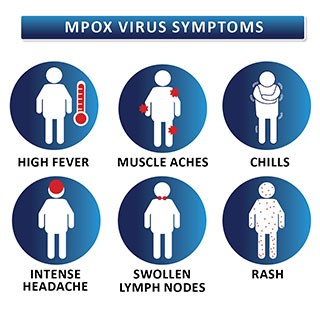Mpox
Mpox (formerly known as Monkeypox) is a rare viral disease related to smallpox. Mpox was first found in 1958 in laboratory monkeys, though other types of animals may carry it. Mpox was reported in humans for the first time in 1970.
U.S. Mpox cases are very rare. Mpox does not occur naturally in the United States, but cases have happened that were associated with international travel or importing animals from areas where the disease is more common.


Tracking Cases
Visit this CDC Mpox website to keep up-to-date with the current locations and number of Monkeypox cases.
The CDC is tracking multiple clusters of Mpox that have been reported in early- to mid-May in several countries that do not normally report monkeypox, including in Europe and North America.
It’s not clear how people in those clusters were exposed to Mpox but cases include people who self-identify as men who have sex with men or who have large sexual networks. CDC is urging healthcare providers in the U.S. to be alert for patients who have rash illnesses consistent with Mpox, regardless of whether they have travel or specific risk factors for Mpox and regardless of gender or sexual orientation.

Signs and Symptoms
The symptoms of Mpox are similar to but milder than the symptoms of smallpox.
The illness begins with:
- Fever
- Headache
- Muscle aches
- Backache
- Swollen lymph nodes
- Chills
- Exhaustion
- A rash that may have been flat and then formed blisters or has crusted
The main difference between symptoms of smallpox and Mpox is that Mpox causes lymph nodes to swell (lymphadenopathy) while smallpox does not. The incubation period (time from infection to symptoms) for Mpox is usually 7−14 days but can range from 5−21 days.

Within one to three days (sometimes longer) after the appearance of fever, the patient develops a rash, often beginning on the face then spreading to other parts of the body.
The illness typically lasts for two − four weeks. In Africa, Mpox has been shown to cause death in as many as one in ten peoople who contract the disease.

Transmission
Human-to-human transmission typically occurs through respiratory droplets or contact with an infected patient’s skin lesions, such as when a person comes into contact with the virus from an animal, human or materials contaminated with the virus.
Respiratory droplets generally cannot travel more than a few feet, so prolonged face-to-face contact is required. Other human-to-human methods of transmission include direct contact with body fluids or lesion material, and indirect contact with lesion material, such as through contaminated clothing or linens. The virus enters the body through broken skin (even if not visible), respiratory tract, or the mucous membranes (eyes, nose, or mouth).
Visit the CDC's website on Social Gatherings, Safer Sex and Mpox to read more about how the virus can spread through sexual activity or at raves, parties, clubs, and festivals.
Animal-to-human transmission may occur by bite or scratch, bush meat preparation, direct contact with body fluids or lesion material, or indirect contact with lesion material, such as through contaminated bedding.
People who have not had close contact with a wild or exotic animal or infected person are not likely at risk.

Treatment Options
Currently, there are no specific treatments available for monkeypox infection. However, outbreaks can be controlled by use of existing medications: Smallpox vaccine, cidofovir, ST-246, and vaccinia immune globulin (VIG).
The CDC recommends that people investigating Mpox outbreaks and involved in caring for infected individuals or animals should receive a smallpox vaccination to protect themselves against Mpox. People who have had close or intimate contact with individuals or animals confirmed to have Mpox also should be vaccinated. People can be vaccinated up to 14 days after exposure.
Visit this CDC website about Treatment to learn more.
People who think they may have been exposed to a person or an animal with Mpox should contact their health care provider or call the Tarrant County Public Health Call Center at 817-248-6299.

CDC Travel Guidance
Currently, the CDC has issued a Travel Alert Level 2.
Here are some recommendations for travelers to lower your risk of Mpox.

Presentation Request
If you and your organization would like to learn more about Monkeypox, please complete the request form and return via email.


 TARRANT COUNTY, TX
TARRANT COUNTY, TX

 Public Health
Public Health